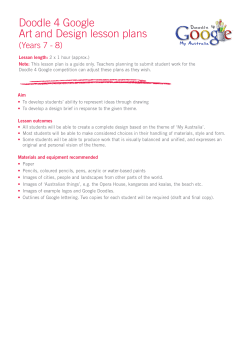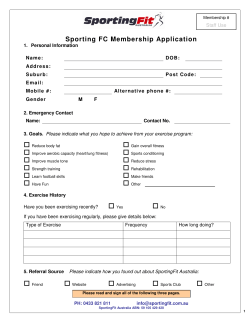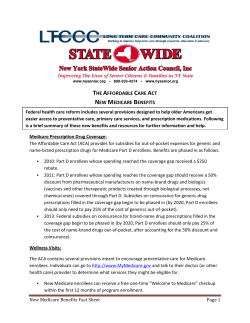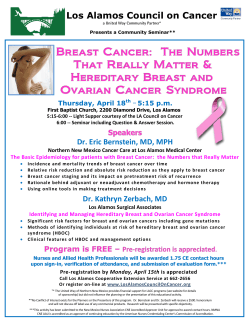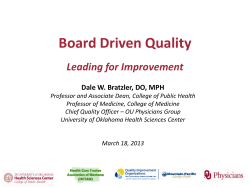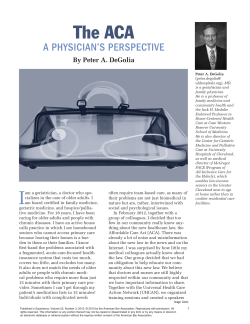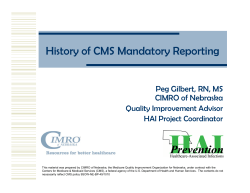
local informer Vaccinations are Important Contents
localinformer Your monthly newsletter from Goldfields - Midwest Medicare Local email: mail@gmml.org.au website: www.gmml.org.au Vaccinations are Important With school students now back at school, parents are being urged to make sure their children’s immunisations are up to date, or consider immunising their children if they aren’t already. February 2014 Contents Vaccinations are Important ........................................ 1 Schools, preschools, kindergartens and child care centres are places where children interact closely and it is vital they are protected against vaccine preventable diseases. Children should receive vaccinations at birth, two months, four months, six months, one year, 18 months and four years of age. What to Expect When You are Expecting........................... 2 The National Immunisation Program provides immunisation protection for children against disease such as measles, diphtheria, pertussis or whopping cough, polio, hepatitis B, Hib, meningococcal C and invasive pneumococcal disease. These diseases are still very widespread in many other areas of the world, particularly in our neighbouring countries. A Day in the Life of a Rural Social Worker......................... 3 Goldfields - Midwest Medicare Local’s (GMML’s) CEO, Brenda Ryan said “one of GMML’s top priorities was raising awareness of the importance of timely vaccinations for children in the region and we hope to improve overall vaccination rates in our region to over and above the gold standard of 90%”. Funding for Cervical Cancer Prevention........................... 5 For up to date information on immunisations or storage and handling of vaccines, contact your local GMML Immunisation Program Officer. Ovarian Cancer Month.................... 6 Midwest 9960 6800 Goldfields 9080 0400 Reach for Your Goals Takes a Road Trip........................... 2 Healthy Weight Week 2014............. 4 Nutrition Bites ................................. 4 GMML Provides Good Practice...........................................5 Become a John Flynn Mentor............................................. 6 Local Informer Calendar.................. 7 Free Weight Loss Support............... 8 Goldfields - Midwest Medicare Local Head Office, Level 1, 209 Foreshore Drive, Geraldton WA 6530 Ph: 9960 6800 Fax: 9960 6899 Click here to unsubscribe from this newsletter GMMLlocalinformer What to Expect When You are Expecting! The idea of parenthood can be an exciting, yet daunting time for expectant parents. paediatrician and baby related businesses such as House of Babes and Kerry Baker Photography. To assist expectant mothers and their partners learn the basics about pregnancy and babies, Goldfields - Midwest Medicare Local (GMML) Kalgoorlie, in conjunction with Collins Street Surgery and many other health professionals and baby associated businesses, organised a baby shower for all of the Collins Street Surgery’s pregnant patients. The day was filled with valuable information, a healthy lunch and lucky door prizes. Each expectant mother left the shower with new knowledge on what to expect when you’re expecting, as well as a care package kindly donated by House of Babes and Kerry Baker Photography. Pictured: Eileen Kavanagh and Joanne Appleton, House of Babes Held on Saturday, 8 February 2014, the health professionals involved on the day included GMML’s dietitian Kate Stanfield. Kate discussed antenatal nutrition to the audience, including healthy weight gain, cravings, morning sickness, important nutrients and food safety. Other presenters included Collins Street Surgery’s General Practitioner April Armstrong, local pharmacist, community nurse, immunisation nurse, post natal psychologist, eternal therapist, Reach for Your Goals takes a Road Trip The Reach for Your Goals project is set for a road trip through the Goldfields to promote its anti-smoking and healthy lifestyle message. The Reach for Your Goals project was conducted under the banner of Closing the Gap; a national initiative addressing Aboriginal disadvantage in many areas including health. The project was created by Goldfields - Midwest Medicare Local (GMML) in partnership with WA Country Health Service (WACHS) in 2011. The project is aimed at tackling smoking in youth and is comprised of a hip hop CD and a film titled “Reach for Your Goals”. The project is targeting and visiting schools with medium to high Aboriginal student numbers in years 5 through to10. Ben Djuve, Educational Facilitator at GMML will lead the education sessions for the Reach for Your Goals project. Ben will start the incursions at Wiluna Remote Community School in the second week of term one and make his way down to the schools within the Kalgoorlie region. “I am really excited to have the opportunity to promote this positive message across approximately 13 schools within the Goldfields region, including schools in Kalgoorlie, Norseman, Leinster, Leonora, Menzies, Wiluna and Kambalda” Ben said. At each school, (local, regional and remote) the students will engage with a variety of activities based on the Reach for Your Goals message, smoking statistics and interactive websites with plenty of Reach for Your Goals giveaways. Each class that participates will be given a ‘Teacher’s Resource Kit’ designed to 2 enable teachers and schools to continue educating their students about leading a healthy lifestyle and the effects of smoking. “The project was well received by all participating schools and teachers here in the Midwest. I am looking forward to creating the same positive experiences again throughout the Goldfields” Ben said. “Smoking is a major contributor to chronic disease and premature death within many communities and we hope that through the success of the project and the incursion program, we can empower individuals, groups and communities to make a positive change and work towards a healthier community”. If you would like further information about the Reach for Your Goals project, or would like to view the film clip, visit www.gmml.org.au/Our Programs/Closing the Gap Pictured: Ben Djuve with students from Midwest road trip profiling the region’s health professionals “Joseph is very passionate about his job and has had a great deal of experience we’re lucky to have him on board at GMML” Amy Ryan, GMML A day in the life of a rural social worker Goldfields - Midwest Medicare Local (GMML) recently appointed two new staff members to their Kalgoorlie mental health team; This month, Joseph Fleming, ATAPS clinician shares his challenges and experiences with us. Pictured: Village visit Fiji, USP How long have you been a social worker? Having started my social work journey at the age of 20 in Western Australia, I recently returned home in WA to take up the role of an ATAPS clinician at Goldfields Midwest Medicare Local (GMML), Kalgoorlie. Why did you become a social worker? I was initially drawn to social work by the opportunity to offer practical and emotional assistance to people from all walks of life and diverse backgrounds. This interest has developed into a passion for practicing in rural and remote settings and a professional career that has taken me to many interesting places. It has been my experience, that as a profession, social work is as diverse as they come, with opportunities to work in various practice fields, settings and locations. Since graduating as a social worker in 1995, I have worked in the areas of child protection, adult and youth mental health, aged care, corrections and most recently, tertiary education. Social work has taken me to many wonderful places and I feel privileged to work with many diverse groups, each with their own stories. From an early age, I knew I was interested in working with people and initially, I thought this would be as an occupational therapist. It was social work however that drew me in and has kept me here for over 17 years. never boring. The ‘global social work village’ offers many unique ways to enhance one’s practice and has certainly inspired me. Have you worked in any exciting locations? What are your areas of interest in social work? I have worked across Australia from south west Western Australia, Far North Queensland, Tasmania and even Fiji. Working in rural and remote settings has given me the opportunity to challenge my thinking as well as develop my social work practice. In particular, I have developed an interest in ways in which social work and other helping professionals can engage biological fathers and ‘social fathers’ (an unrelated male who takes a de facto responsibility for a child) more effectively in practice. Experience of practitioners with fathers was the focus of my PhD research through the Department of Social Work at Monash University. What has been a memorable experience? My greatest learning experience so far has been whilst working for the Royal Flying Doctor Service with an Indigenous community in Far North Queensland. My time at the Aurukun Wellbeing Centre (Aawuch Ngangk Kemp Min Aak) and in the Aurukun community taught me many lessons; the main one that has always stayed with me is to ‘take time to know your village’. I will always remember the advice of a co-worker who would take the time to physically visit the location in which he would be living and working before starting work in a new town or community. I have seen many social workers learn the hard way by wanting to change things immediately, something which can be quite damaging and lead to further problems. From my own experience, working in remote locations can be very demanding and often risky, but Wherever I am working, my aim is to always facilitate dialogue and create a space where individuals and communities can come together to address issues in their environment. Social work for me is about relationships and it is the relationship between these elements are important. Pictured: Joseph Fleming (centre) with staff at Aawuch Ngangk Kemp Min Aak 3 GMMLlocalinformer Healthy Weight Week 2014 Australia’s Healthy Weight Week from the 17 - 23 February is part of the Dietitian’s Association of Australia’s comprehensive obesity strategy. Australia’s Healthy Weight Week raises awareness of the importance of achieving and maintaining a healthy weight and healthy lifestyle and thus aims to address the significant issue of Australia’s rate of overweight and obesity. Supporting Australia’s Healthy Weight Week this year is celebrity chef Callum Hann who has developed a cookbook that will be available to download from www.healthyweightweek.com.au It is worth reminding ourselves that being overweight or obese can increase the risk of health problems such as: • heart disease • type 2 diabetes • some cancers • gall bladder disease • hypertension • high cholesterol • joint problems such as gout, arthritis and joint pain • sleep apnoea • self esteem issues, energy, confidence and sexual health problems An individual’s BMI (>25) and their waist circumference (>94cm for most men and >80cm for most women) are two of the most common measures used to ascertain overweight and obesity. The great news is that losing just 5 - 10% of your current weight over a six month period, will lower your risk of developing these conditions. The Australian Government has an excellent website called ‘Measure Up’ which contains a lot of useful information for both the broader community and health professionals regarding healthy weight. In 2014, Goldfields - Midwest Medicare Local (GMML) staff in Geraldton and Kalgoorlie will be focusing on staff health and wellbeing and will launch a number of workplace health initiatives and challenges during Australia’s Healthy Weight Week. Staff will be encouraged to participate in challenges targeting weight loss, being physically active and eating the recommended number of fruit and vegetables amongst others. The project will run over a three month period and will include data to track the progress of individual staff members and the organisation as a whole. It is hoped that GMML can set an example to other workplaces and encourage more regional WA organisations to consider the ways in which they can promote the health and wellbeing of their staff. Stay tuned for monthly challenge updates. For more information regarding workplace health initiatives, check out the Healthier Workplace WA website at www.healthierworkplacewa.com.au Hannah Bleakley Senior Health Promotion Officer GMML Geraldton 4 Do you consume too much salt? • Up to 6,000 Australian lives can be saved if we can reduce the amount of salt by 30%. • 75% of the salt we consume is in the processed foods we eat every day, such as bread, cereals, processed meats, cheese, sauces and spreads. • Australian’s are currently eating (on average) 9g of salt every day. This is much more than the maximum 6g recommended for adults (or 4g if you have high blood pressure). Most of us are doing the right thing and not adding salt when we cook or at the table, but we’re still eating much more than we realise. • Reducing our intake of sodium from processed foods by just over 15% over ten years, could stop 5,800 heart attacks and 4,900 strokes each year. So what can you do to limit your salt consumption? • Use other flavourings instead of salt, such as herbs and spices. • Avoid stock / stock cubes and soy sauces as these are high in salt. Always buy the salt reduced version. • Remove salt from your table so there is not temptation to add more. • As always, fresh is best as no salt has been added to preserve the food. • Limit takeaway and highly processed foods such as pies and sausages. • Start reading food labels (the nutrition information panel). This will tell you how much salt / sodium per 100g in the product. The best foods are those <120mg / 100g, but aiming for <400mg / 100g is more realistic with most products. • Buy the food product that is low in salt, or salt reduced, if available. For more healthy eating tips, email the GMML dietitians at GMML.dietetics@gmml.org.au GMMLlocalinformer Funding for Cervical Cancer Prevention The WA Cervical Cancer Prevention Program (WACCPP) is pleased to offer health services across Western Australia the opportunity to apply for grant funding to help prevent cervical cancer in local communities. Grants of up to $3,000 are available for project activities that take place between April and September 2014. If an organisation is coordinating a project or campaign on behalf of a WA Country Health Service region (Kimberley, Pilbara, Midwest, Goldfields, Wheatbelt, South West or Great Southern) they can apply for up to $10,000. Both government and non-government organisations are eligible to apply with partnerships between stakeholders encouraged. The types of activities that will be considered for funding include: • Linking to the BreastScreen WA mobile service to offer women cervical screening along with their mammogram. • Offering cervical screening or information about cervical screening at events such as a Well Women’s Day. • Health promotion activities or events that encourage women to participate in cervical screening. • Promoting cervical cancer prevention through advertising, local media or social media. • Cervical screening information sessions that connect women to clinical services. For more information, visit www.health.wa.gov.au/cervical/getinvolved/grants.cfm or contact Lanny Hoskin on 9323 6776 • Organising a health care provider to offer cervical screening to women in a local community. This may include after hours or weekend clinics. • Supplies or equipment for cervical screening clinics. GMML Provides Good Practice The research project identified eight core principles of good practice in primary mental health care. These include: • a client centred approach • collaborative practice • population health approach Goldfields - Midwest Medicare Local (GMML) was selected as one of eleven Medicare Locals by the Australian Medicare Local Alliance (AML Alliance) to participate in their research project on what constitutes ‘good practice’ in primary mental health care. GMML’s CEO, clinical services manager, team leader and GMML mental health professionals were interviewed by AML Alliance in early 2013 to identify what constitutes good clinical practice within GMML’s Access to Allied Psychological Services (ATAPS) and Mental Health Services Rural and Remote Areas Program (MHSRAP). AML Alliance was particularly interested in the unique challenges of providing these services in rural and remote areas. The Women’s Resource Centre was also interviewed by AML Alliance as a community service partnering with GMML to provide the ‘Mum’s Matter’ group for women with post natal depression. • an evidence based service with flexible capabilities • appropriate infrastructure • multi-disciplinary workforce • good clinical governance • established partnerships GMML’s director of operations and clinical services manager presented an overview of GMML’s Mental Health Services at the AML Alliance Good Practice Conference in Adelaide in December 2013. Participating in the AML Alliance Good Governance research project was a wonderful opportunity for GMML to reflect on all the hard work GMML’s mental health team have put into establishing a high quality mental health service since GMML was established in January 2012. It gave the mental health team an opportunity to identify areas of success, as well as potential areas of development in our mental health programs utilising the eight core principals of good practice in primary mental health care. 5 GMMLlocalinformer Ovarian Cancer Month low incidence cancer and it is quite common for women’s symptoms to be attributable to other more common and less severe health conditions. We communicate this clearly in all our symptom awareness resources. Ovarian Cancer Awareness Month held in February each year, is a national campaign to raise awareness of ovarian cancer with the general public and to ensure that every woman knows the symptoms. Awareness Month is also a time when Ovarian Cancer Australia invites the community, volunteers and friends to raise vital funds for support programs and resources for women and their families affected by ovarian cancer and for a national research program. During Ovarian Cancer Month in February, GPs may see women with a heightened awareness of ovarian cancer and concern relating to the symptoms they are experiencing. The four most frequently reported symptoms from women diagnosed with ovarian cancer are: • abdominal or pelvic pain • increased abdominal size or persistent abdominal bloating • needing to urinate often or urgently • feeling full after eating a small amount We advise women that if these symptoms are new or unusual and have been experienced on most days over 2 - 4 weeks, to see their doctor. Additionally, if women experience bleeding after menopause or in between periods, pain during sex or bleeding after sex, we advise them to get these symptoms checked by their doctor. Ovarian cancer is a 6 After ruling out more common causes of symptoms, GPs can perform a pelvic examination and arrange a trans-vaginal (internal) ultrasound and a CA125 blood test. If these tests indicate that ovarian cancer is a possibility, GPs should refer their patient to a gynaecological oncologist working within a multi-disciplinary team. Cancer Australia has two very useful resources on their website at www.ovariancancer.net.au which can assist GPs in their consultations. • Assessment of symptoms that may be ovarian cancer Intended to assist general practitioners assess whether a woman with persistent, unexplained symptoms may have ovarian cancer. • Appropriate referral of women with suspected ovarian cancer Provides information to assist clinicians to identify those women who should be referred to a gynaecological oncologist and includes a risk of malignancy index. All women with a suspected or diagnosed gynaecological cancer should have access to a comprehensive multi-disciplinary team led by a gynaecological oncologist to provide high quality management tailored to her needs to achieve the best outcome for each woman. Ovarian Cancer Australia is the country’s only organisation for ovarian cancer awareness, support, advocacy and research. It is a national not for profit organisation founded in 2001 by people directly affected by ovarian cancer. Become a John Flynn Mentor The John Flynn Placement Program is an important part of the Australia government’s strategy to attract more doctors to rural and remote communities. Each year, 300 students secure a place in the program to experience life and clinical practice as a rural doctor. Each student is matched to a mentor. Students visit their mentor for a minimum of two weeks a year, over four consecutive years. During their placement, students can also spend time with other doctors, practice nurses, in general practice clinics, in local hospitals, or in other medically focused organisations such as ambulance stations and nursing homes to broaden their learning experience. As a mentor in the John Flynn Placement Program you give selected medical students a rare opportunity to observe you in your practice first hand and to appreciate the personal benefits of living in rural Australia. Your participation in this program is also a great advertisement for rural GP careers. As a mentor you can: • influence a career path for an aspiring doctor • showcase your practice and community • be eligible to earn ACRRM PDP points or RACGP CPD points • receive a $300 (+GST) honorarium per placement week • mentor without undertaking any formal training or do any formal reporting To become a John Flynn mentor, or to find out more information, visit www.acrrm.org.au/mentors or phone 1800 231 231 localinformercalendar FEBRUARY Community Perinatal Mental Health Network You are invited to attend our annual forum on perinatal mental health in the Midwest. 19 February | Community Health Group Room | Geraldton 11:30am - 1:30pm Working in Early Childhood Intervention This is a free workshop for health professionals, carers and early childhood staff and will be delivered by Childhood Intervention Australia and the Disability Services Commission and hosted by CUCRH. Register by emailing edsim-cucrh@uwa.edu.au 25 February | CUCRH Geraldton | 9:00am - 4:30pm Immunisation Workshop for Nurses GMML is offering an influenza vaccination refresher workshop for nurses to maintain their WA Immunisation Certification competency. Presented by Dr Marisa Gilles. APRIL Highlights from ANZCA Autumn Scientific Meeting Presented by Dr Jeremy Beckett and Dr Ian Taylor. 26 February | SJOG Training Room Geraldton | 12:30pm - 2:00pm Anaesthetists Monthly Meeting 3 April | SJOG Training Room Geraldton | 7:30am - 8:30am MARCH Midwifery Up Skilling This course is presented by Cranaplus and aims to provide an overview of current practice in antenatal, intrapartum and postnatal care for midwives working in remote and isolated areas. 7 - 9 March | Kalgoorlie Hospital 3:00pm - 5:00pm GMML Information Night GMML would like to invite you to an information evening with CEO Brenda Ryan. We will provide you with information and insight into the programs and services GMML currently offer and recent key activities. 25 February | GMML Kalgoorlie 6:00pm - 8:30pm UWA CPD Health Quality Education | Quality Outcomes Cardiovascular Seminar Heart Failure Find—Treat— Prolong Life Saturday 8 March 2014 8.00am – 3.00pm Dr Rob Grenfell—Heart Foundation National Director The University Club of Western Australia A balanced response to ABC Catalyst Winthrop Professor Gerald Watts: Continuing Professional Development Cholesterol: treat the patient and the family? 5 active learning hours Atrial Fibrillation Warfarin vs NOACs Optional post seminar assessment Seminar attendance fully catered ONLINE availability Cost: $250 or $95 online Subsidised places available for some Medicare Local (ML) Members—contact your ML to see if you qualify Navigating the cardiac rehabilitation road to recovery Topics and Speakers For further information on any of these events, please contact your local GMML office Geraldton 9960 6800 Kalgoorlie 9080 0400 Please note that events are subject to change at short notice Program and Registration details: www.medpharm.uwa.edu.au /cpd/program Contact Lesley Gregory 08 6488 7510 cpdhealth@uwa.edu.au Claudication and lower limb ischaemia: an update on PVD management - Stefan Ponosh Aortic Aneurysms: Incidence, investigations and treatment Brendan Stanley Atrial Fibrillation - Warfarin vs. the NOACs - Vince Paul Familial Hypercholesterolaemia - Gerald Watts Cardiac rehabilitation - Hazel Mountford The SNAPSHOT study - Tom Briffa Managing absolute cardiovascular risk– Rob Grenfell Heart Failure: Detection, diagnosis and early management - TBC This fully-catered forum has been developed in collaboration with the Cardiovascular Health Network, The Heart Foundation and Medicare Locals. It will provide an update on best practice and research in cardiovascular disease management in Western Australia 7 st idwe e our M s hav field Gold cal now re Lo etitians! a c i d di Me own Free Weight Loss Support by Qualified Dietitians Goldfields-Midwest Medicare Local What: Free 6 week program. Each session will run for approximately an hour and will cover a variety of topics including recipe modification, portion sizes, label reading and healthy expectations for weight loss. Included in the program will also be a supermarket tour, cooking and physical activity session. Dates: Consecutive Thursdays, commencing: Program 1; Thurs 16th January, 23rd, 30th, 6th Feb, 13th, 20th Program 2; 6th March, 13th, 20th, 27th, 3rd April, 10th Program 3; 24th, 1st May, 8th, 15th, 22nd, 29th Who: Anyone in the community who is interested in losing weight in a friendly group environment Where: The Program will be run from the Allied Health Centre at 32 Holland St, Geraldton. To register for this program or for further enquiries please contact GMML.dietetics@gmml.org.au or phone 08 9920 7114 (after January 6th) to speak to one of the dietitians.
© Copyright 2025



